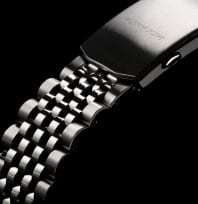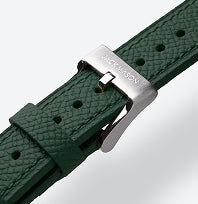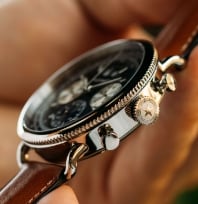There are three main types of movement, or rather, the energy that standard watches use to function. These movements keep the watch gears turning and the time ticking and can be described as mechanical, automatic, and quartz or solar quartz.
What is the difference in these watches, and what are their strengths and shortcomings?
The Three Movements
Mechanical
Mechanical watches contain no battery at all, have around a 40-hour power reserve, and are powered by the crown's winding, the small push/pull pin located on the side of the watch. You have to wind the crown regularly for it to continue humming along. It is best to do this off your wrist to avoid placing any strain on the internal mechanisms. To wind a mechanical watch, simply hold the crown between your thumb and pointer finger and wind it clockwise, you'll be able to feel the resistance and know when the watch is fully wound.
This winding movement stores energy into the mainspring of the watch, and that energy is then transferred to the other components to keep them spinning. Winding a watch is okay under regular wear, it's even got the cool factor of being 'old school' or more genuine. But what if you trade out your mechanical watch face for a while and store it? You will need to come back and periodically wind the watch even when you are not wearing it or invest in a watch winder.
Automatic
The automatic watch also contains no battery, but energy is stored in the mainspring by the rotation of a small rotor on the watch's movement. That rotor turns simply on the everyday movement of the wearers' wrist, so you should plan to wear it daily to keep it running. What if you aren't wearing your automatic watch for a few days? You will need to come back and periodically wind your automatic watch for it to continue storing energy and keep on ticking.
To do this, you will need to unscrew the crown until it is in the first position, wind it twenty to forty times till you feel the same resistance. It is then fully wound. You will need to screw the crown back in. Looking for examples of automatic watches? Feast your eyes on our highly rated Jack Mason automatic watches.
Quartz
Are powered by a battery. These are considered the most popular watches because they are affordable, and they are the most accurate at keeping time. A good example is our Overland Japanese Quartz watch. Though the battery of a quartz watch is long, it is not nearly as long as a solar watch. If longevity is what you seek, look no further than the solar watch.
Solar Watches
What if there was a watch that combined the best of all three worlds? The longevity of a mechanical or automatic movement's longevity while providing the precise accuracy of a quartz watch? Enter the solar watch.
All the shortcomings of mechanical or automatic watches are a total non-issue in the solar watch. A solar watch battery will not die after a few years. It continuously self charges with access to any light, both artificial and natural. This means the watch will charge whether you are in the office or out enjoying nature. These rechargeable batteries also allow for features that are generally not easily affordable or found in mechanical or automatic watches because these features would drain the battery quickly and require more space and mechanisms to store enough energy to keep these features going.
The extended battery life of a solar watch at an affordable price means that a basic solar watch can come chocked full of features not available to the everyday man's budget in the world of mechanical, automatic, and yes, even standard quartz watches.
Basic Features of a Solar Watch
A lot of the basic features of a solar watch can be found on some more expensive mechanical watches as well. Still, the features definitely use more energy, and your mechanical watch will need to be wound more often to accommodate these features, which come standard on a solar watch.
Some of these basic features are:
- Compass
- Barometer
- Al temperature
- Durability
Solar watches can also boast more luxury features in a single compact watch case. These features that would normally drain the battery more quickly on the standard quartz watch or drain the energy of a mechanical or automatic watch come with ease on a solar watch. The cells of a solar watch are constantly being recharged by regular light exposure.
Some of these advanced features include:
- Multiple daily alarms
- Automatic calendars displaying month and year
- LED backlights
- Some solar watches even have GPS capabilities
While these features are not seemingly necessary for everyday use, they can make the difference in choosing a watch you can wear at the office and transition into a weekend of outdoor activity just by trading your suit for some board shorts.
Main Benefits of a Solar Watch
Durability and Versatility
A solar watch never needs to be wound and, therefore, will have no downtime and is ready to wear at any given moment, naturally giving way to a carefree and active lifestyle without worry.
Solar watches are durable. Because solar watches don't require an external crown or access to the battery, solar watches, usually have a higher water resistance rating, even with more affordable and non-diving watches. With less of a need to access the inside of the watch, the seals on the solar watch themselves can withstand harsher environments and more exposure to varying temperatures. Imagine a weekend skiing in Boulder, Co, followed by backpacking across the Moab desert just a few days later without worrying about the integrity of your watch. Imagine having the peace of mind that your watch will keep ticking the same way your busy and active lifestyle does. Your solar watch grounds you as you head back into your workweek, daydreaming of your next sunny excursion.
But your solar watch doesn't always have to be in the sun to keep ticking. Some solar watch brands can last without sun for over seven days to even six months, so if it's heading out to rainy Pacific NorthWest, you are after there are no worries with your solar watch. Your solar watch will even recharge itself from artificial light when grabbing a quick bite at a cafe or catching up on some email at the coffee shop.
Accuracy
Solar watches are also some of the most accurate watches on the market. They outperform the majority of standard quartz watches and not to mention beat the accuracy of any mechanical or automatic with its mere plus or minus +/-15 seconds accuracy per month as opposed to even the best mechanical weighing in at +/- 2 seconds a day. This is huge! After 2 seconds a day for a year, your watch could be almost seven minutes behind.
Affordability
With the endless styles and budget options of solar watches, it is easy to find a quality and stylish solar watch in almost any budget with the needs of the wearer in mind. A solar watch can even boast the look and feel of a mechanical watch with all the bonus actions of a solar watch.
A quick internet search reveals price points on quality and well-rated solar watches as low as $30 and as high as $1,500.
Final Thoughts
In the end, the watch is about the wearer. Whether you dream of weekends with the family riding bikes, wake-boarding on the lake, staying up late at night telling summer ghost stories, and toasting marshmallows by the fire, you can feel confident in checking your watch one last time by backlight LED while you zip the kiddos into their sleeping bags, knowing that your solar watch can do anything that you can do.
What do you dream of doing, and will your watch withstand the journey?
Sources:
https://www.overstock.com/guides/faqs-about-solar-watches
https://timepiecelegacy.com/are-solar-watches-reliable/
https://watchranker.com/solar-watches-pros-and-cons/









